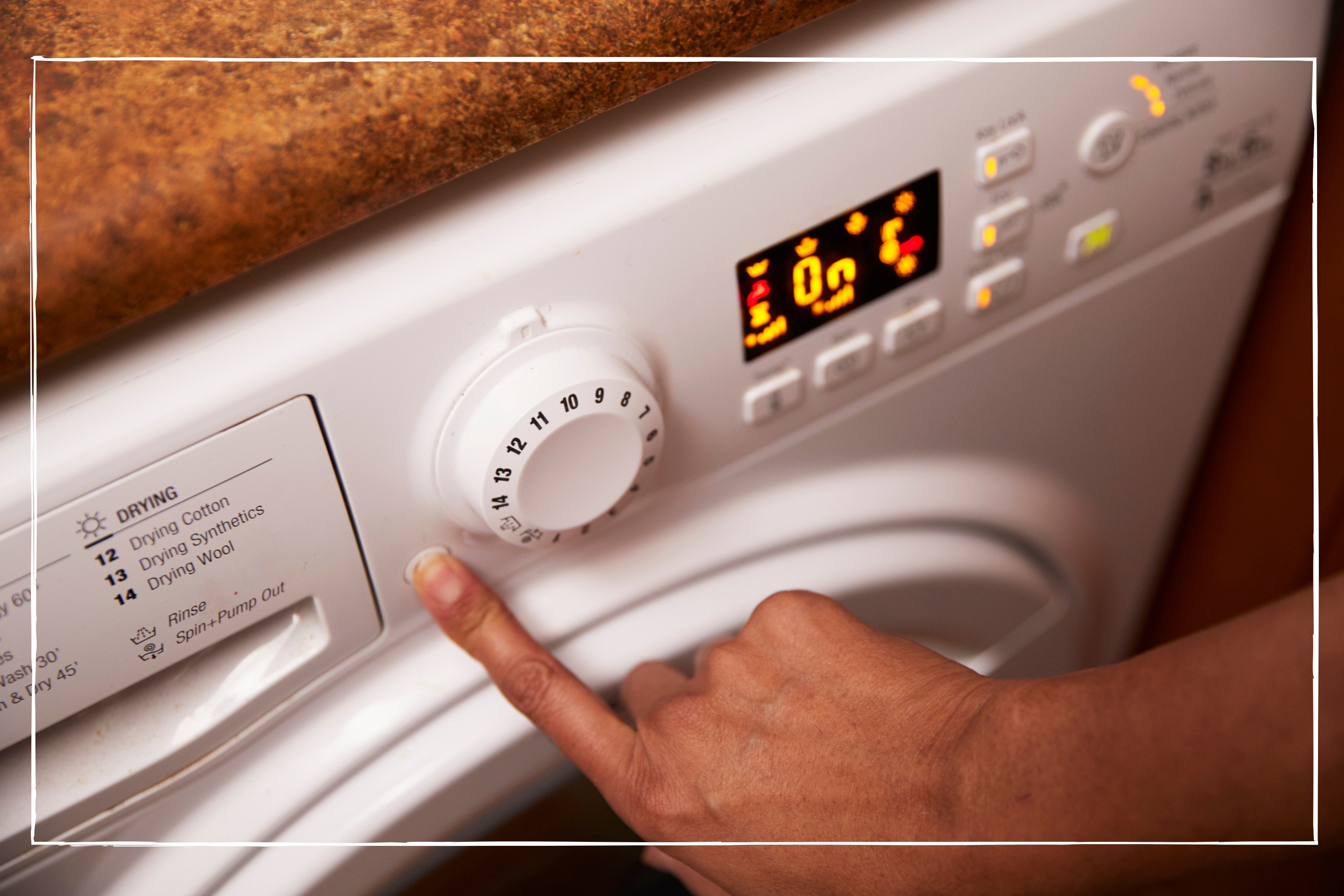How much does it cost to run a washing machine and how can you make it cheaper?
Want to know how much it costs to run a washing machine in a bid to keep your energy bills under control? We’ve crunched the numbers to find out, and explain how you can lower the running costs to save money

Rachel Wait
Recent updates
The costs in this article have been updated in line with the new energy price cap that came into effect on 1 October 2023.
Many families will be wondering how much does it cost to run a washing machine and how can you lower the cost, as even though energy prices dropped as of 1 October, they are still considerably more expensive than before the energy crisis started.
Millions of families have been worried about how much their energy bills will cost since early 2022. But while the energy price cap has dropped by £151 to £1,923, it is still around £700 higher than it was before the energy crisis. That means it's still important to understand how to save energy in homes and keep your bills as low as possible. And with washing machines being some of the most energy hungry appliances in the home, it's a good place to start.
Goodto.com's Money Editor Sarah Handley says: "Your washing machine is one of those appliances where, with a couple of small changes, you could significantly reduce how much energy you use, reducing your bill in the process."
How much does it cost to run a washing machine?
A washing machine currently costs between 12p and 20p to run per load. That works out as between £24.96 and £41.60 per year. This is based on a 8kg drum washing machine (suitable for medium-sized families) with an energy rating of between A and D that's used an average of four times per week.
Your exact running costs will depend on the model of your washing machine, its energy rating, how often you use it and how much you pay for your energy.
Below, we have looked at examples of 8kg washing machines with different energy ratings to see how the costs compare. (These are calculated using the energy price cap figures in effect from 1 October 2023).
| Header Cell - Column 0 | Energy consumption | Cost per use | Annual cost |
|---|---|---|---|
| A-rated washing machine | 0.46kWh | 12p | £24.96 |
| B-rated washing machine | 0.55kWh | 15p | £31.20 |
| C-rated washing machine | 0.62kWh | 17p | £35.36 |
| D-rated washing machine | 0.73kWh | 20p | £41.60 |
Appliances, like washing machines, are categorised by energy efficiency ratings from A to G, with A being the most energy efficient and G being the least efficient. The better-rated washing machines use less energy to do their job which means they don't cost as much to run. Lower rated washing machines use more energy and so cost more to run. But higher rated washing machines cost more to buy.
GoodtoKnow Newsletter
Parenting advice, hot topics, best buys and family finance tips delivered straight to your inbox.
Ben Gallizzi, energy expert at Uswitch.com, said: “More efficient washing machines may be more costly, so you need to weigh up whether the savings from lower running costs are worth the extra expense.
"Work out your budget and see what rating you can go for. If a C rating or D rating is in your budget, then that’s a lot better than an E or F rating."
The above figures only take electricity costs into consideration, but there are also water costs to think about. Research by website In The Wash, shows that the average washing machine uses 46.28 litres of water per cycle, and the average cost of water per litre in the UK is 0.3p. This means the average washing machine uses 14p of water per use, taking your total costs to between 26p and 34p per cycle, depending on the efficiency of the machine.
Compare how much your most-used appliances cost to run with our handy tool:
What’s the cheapest time to run your washing machine?
The cheapest time to run your washing machine will depend on the type of energy tariff you’re on. If you pay a flat rate for your electricity, the cost of running your washing machine will be the same, regardless of the time of day or night you use it. But if you have an Economy 7 or Economy 10 electricity meter, you will pay less for energy you use at off peak times. A spokesperson for home appliance brand Beko told us: “If your tariff is not charged at a flat rate, running your washing machine at times when electricity is cheaper, such as early in the morning or late in the evening, is a great way to reduce costs.” With an Economy 7 or Economy 10 electricity meter, you will have cheaper electricity for seven or 10 hours a day, usually at night. But the day time rates then tend to be more expensive.
If you are looking to change your tariff, use website like Go.Compare to see what kind of deals are available.
Over the last winter, when energy supplies were low and there was talk of rolling blackouts across the country to help manage supply and demand, families were encouraged to avoid using their energy-hungry appliances during peak times. To encourage this, some suppliers offered money off energy bills if a households energy usage was reduced by a certain amount during peak times. This could come back into play in winter 2023.
How to cut the cost of running your washing machine
There are many ways to cut the running costs of your washing machine, from cutting down on the number of washes you do and making sure you only wash full loads to using your machine's eco mode or choosing a lower temperature.
Energy expert at Property Rescue, Callum Woodstock says: “We’re all doing our best at the moment to cut down on costs and, while most of us can’t manage without our washing machines, there are a few things you can do to minimise the cost of doing your laundry.”
Make sure you wash full loads
Washing small loads multiple times a week is an expensive way to use your washing machine. It uses the same amount of energy (and water), and therefore costs the same, to run a half-full washing machine than it does to run the appliance with a full load.
If you can, wait until you have a full load before you put the washing on to keep costs as low as possible (unless your washing machine has a half-load setting). You might even find you can reduce the number of washes you need to do per week. This not only reduces your energy consumption and keeps your bills as low as they can be, but also reduces wear and tear on your washing machine, which means it's likely to last longer before it needs to be replaced.
But it is important not to overload your machine, and that could cause damage to the drum and make it less efficient.
Wash your clothes at a lower temperature
Washing your clothes at a lower temperature can help you cut back on energy costs. Lower temperatures use less energy and while older models are likely to have an option to wash at 30°C, a 20°C option has been a compulsory design feature on newer models since 2013 thanks to the European Union’s Ecodesign initiative. The Energy Saving Trust says that washing at lower temperatures is particularly worth considering with clothing that is not heavily soiled. According to Which? making that switch from 40°C to 30°C will cut your energy usage by 38% a year, while going from 30°C to 20°C will cut your energy usage by 62%.
You'll also find that many laundry detergents are now much more effective at cleaning clothes at lower temperatures, so there's no need to worry about your clothes not being clean enough. You might also find that liquid detergents are more effective when washing at lower temperatures rather than powder alternatives.
Invest in a hard water filter
If you live in a hard water area, you might find it harder to get clothes clean in the washing machine. Home water treatment expert at BOS, Gene Fitzgerald explains “This can, unfortunately, increase your bills as you will tend to use more detergent and wash your laundry at a hotter temperature.
“Investing in a hard water filter and using special hard water laundry detergent can help you to get the best out of your wash without flushing your cash away.”
Wash on eco mode
Using your washing machine's eco mode can be a really useful way to cut your running costs. A Beko spokesperson says: “The eco programme is the most energy and water efficient programme to use on a washing machine. By selecting the eco programme as often as possible, you can save a significant amount of energy and water for a standard load; whilst maintaining excellent cleaning results.”
According to Currys, 90% of a washing machine's energy consumption comes from heating up the water for washing. But while an eco mode might use less water and wash at a lower temperature, it tends to be a longer cycle to clean your clothes effectively. So while the eco mode might not save time, it will save energy. But if you are trying to remove some really tough stains, it's worth doing those on a regular cycle for the most effective clean. Even if you only use the eco mode occasionally, rather than for every wash, it'll have a positive effect on the amount of energy you use.
Use laundry balls
Laundry balls are designed to replace the use of laundry detergent when you use your washing machine. As well as being more cost-effective compared to detergent, they are also better for the environment.
Laundry balls are usually made from plastic or rubber and contain tiny bio-ceramic balls which wash your clothes naturally, without the need to use detergent. They can last for up to 1,000 washes and can cost between £5 and £20, depending on the brand.
ecoegg | View at ecoegg, Amazon, Tesco, Wilko, Robert Dyas, Sainsbury's, Lakeland
RRP: from £9.99 for 70 washes | Scents: Fresh Linen, Spring Blossom, Unfragranced
Suitable for sensitive skin, the ecoegg is an environmentally-friendly alternative to laundry detergent and fabric softener. The smallest ecoegg will last for 70 washes, meaning it costs around 14p per wash (10p per wash if you buy refill pellets).
Maintain your washing machine
Maintaining your machine is key to keep it working at its most efficient level. And there are various points to keep an eye on:
- Avoid overloading the machine - it could cause damage and result in a less-effective clean
- Clean filters on a monthly basis
- Check pockets before putting the clothes in the drum - look for loose change, tissues and plastic which can get caught in the machine
- Too much detergent can cause clogs and make your washing machine less effective, so make sure you follow the instructions on the packaging for how much to use.
Think about how often you wash certain items
Some clothes do not need to be washed every time you wear them so try to be mindful about only washing items when necessary.
Laundry detergent brand Persil advises you should wash a pair of jeans after four to five wears, unless they look or smell dirty.
When it comes to towels, bath towels can be washed once a week, while hand towels should be washed every two to three days. Face and tea towels should be washed after each use.
Bedsheets should be washed every week or at least every two weeks.
It's likely that most clothing doesn't need to be washed after each wear, so trying airing items instead. But if anything looks or smells dirty, then it's destined for the laundry basket.
What to look for if you need to buy a new washing machine
If you need to buy a new washing machine, then it makes sense to buy the most energy efficient model you can afford to keep running costs as low as possible.
Check the energy efficiency rating
“Most electrical appliances come with an energy rating between A-G. When shopping for a new washing machine, opt for something closer to an A rating as this will be much more energy efficient when in use,” says Paul Newman at Housetastic.co.uk.
Check the modes
When buying a new washing machine, it’s important to look at what modes it offers. Make sure it suits your needs well, as well as being energy efficient. Some good ones to look out for are eco mode and quick wash, which can wash loads in around 30 minutes. If you need to wash delicates, a hand wash feature would be useful to look out for.
The size of the drum is just as important
Choose a drum size that suits the size of your household. A 6kg drum is usually sufficient for someone who lives alone, 7kg-9kg drums are great for couples and medium-sized families, while a 10kg drum size or more is better suited to large families.
You might also be interested in our other appliance running cost articles:
- How much does a tumble dryer cost to run?
- How much does it cost to run a fan?
- How much does it cost to boil a kettle?
- How much does it cost to run a microwave?
- How much does it cost to run an air fryer?
- How much does it cost to run a heated clothes dryer?
- How much does it cost to run an electric blanket?
- How much does it cost to run a slow cooker?
- How much does it cost to run a dishwasher?
- How much does it cost to run an indoor heater?
- How much does a dehumidifier cost to run?
- How much electricity does a TV use?
Sarah is GoodtoKnow’s Money Editor. After Sarah graduated from University of Wales, Aberystwyth, with a degree in English and Creative Writing, she entered the world of publishing in 2007, working as a writer and digital editor on a range of titles including Real Homes, Homebuilding & Renovating, The Money Edit and more. When not writing or editing, Sarah can be found hanging out with her rockstar dog, getting opinionated about a movie or learning British Sign Language.
- Rachel WaitPersonal finance expert
-
 How to save money: 28 family-friendly money-saving tips for mums and dads
How to save money: 28 family-friendly money-saving tips for mums and dadsUnderstanding how to save money is key to limiting the impact of rising costs as much as possible
By Sarah Handley Published
-
 14 hidden benefits of your Amazon Prime membership
14 hidden benefits of your Amazon Prime membershipWe reveal the less-obvious perks of a Prime membership that will help you get the most value out of your subscription fee
By Rachel Wait Published
-
 14 surprising ways to spend your Tesco Clubcard vouchers - from restaurants and cinema passes to mini breaks and Disney+
14 surprising ways to spend your Tesco Clubcard vouchers - from restaurants and cinema passes to mini breaks and Disney+Tesco Clubcard vouchers can help you cut the cost of everything from groceries and travel to days out and cinema tickets
By Heidi Scrimgeour Published
-
 How to get Disney+ for free and save up to £79.90 a year
How to get Disney+ for free and save up to £79.90 a yearEven though the streaming giant ended its free trial offering, there are still multiple ways you can get Disney+ for free for up to 12 months
By Sarah Handley Published
-
 Parents of teens who have just taken their GCSEs urged to check child benefit status ahead of August deadline
Parents of teens who have just taken their GCSEs urged to check child benefit status ahead of August deadlineWith a child benefit deadline looming, some parents could see their payments reduced or stopped altogether - here's why
By Sarah Handley Published
-
 Parents should hold off buying this back to school staple 'as close to their first day as possible', says retailer
Parents should hold off buying this back to school staple 'as close to their first day as possible', says retailerWith parents turning their attention to kitting their kids out for the new school year, research suggestions which items should be left until the last minute
By Sarah Handley Published
-
 7 ways to save on back to school essentials, as its revealed parents will spend £2.3 billion in 2024
7 ways to save on back to school essentials, as its revealed parents will spend £2.3 billion in 2024We share ways you can get your child all the bits and bobs they need for the new school year, without breaking the bank
By Sarah Handley Published
-
 What day is child benefit paid around the bank holiday? Everything parents need to know
What day is child benefit paid around the bank holiday? Everything parents need to knowKnowing which day child benefit is paid when it comes to the bank holiday can help families plan their budgets accordingly
By Sarah Handley Published
